Unmasking the Arsenal: Dental Teeth Cleaning Tools Explained
Why Understanding Your Dental Cleaning Tools Matters
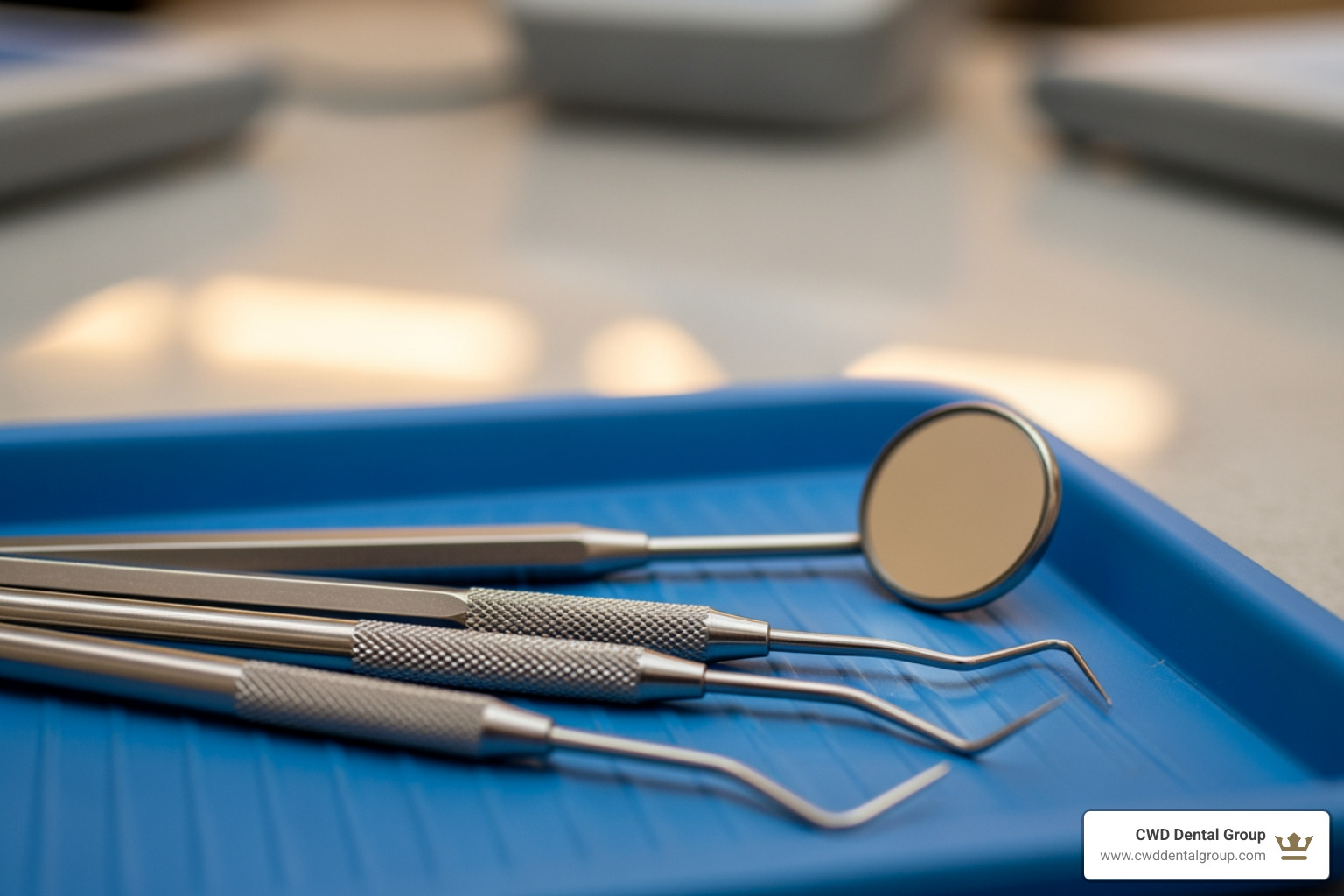
Dental teeth cleaning tools are the specialized instruments dental professionals use to remove plaque, tartar, and stains from your teeth. These tools range from simple mirrors and manual scalers to advanced ultrasonic devices, each designed for a specific purpose in maintaining your oral health.
Key Professional Dental Teeth Cleaning Tools:
- Dental Mirror - Allows the hygienist to see all surfaces of your teeth.
- Scaler/Curette - Manually removes plaque and hardened tartar (calculus).
- Ultrasonic Scaler - Uses high-frequency vibrations and water to break down stubborn tartar.
- Polisher (Prophy Angle) - Smooths and shines teeth after scaling.
- Periodontal Probe - Measures gum pocket depth to assess gum health.
- Saliva Ejector - Removes saliva and debris to keep your mouth dry.
When you sit in the dental chair, your hygienist uses various shiny instruments. But what are they, and why do they matter? The global dental tools market was valued at USD 4.5 billion in 2023, showing how critical these instruments are to oral healthcare.
Understanding the process can reduce anxiety and show why home care, while essential, can't replace a professional cleaning. Some deposits require professional-grade dental teeth cleaning tools and expertise for safe removal.
Many wonder about using these tools at home, but professional instruments require years of training to master. Incorrect use can damage your gums or tooth enamel, harming your oral health.
I'm Kayle Vernon. My background is in marketing, and I've spent over a decade helping practices like CWD Dental Group explain complex topics like dental teeth cleaning tools. This article breaks down what your dental team uses and why it's vital for your oral health.
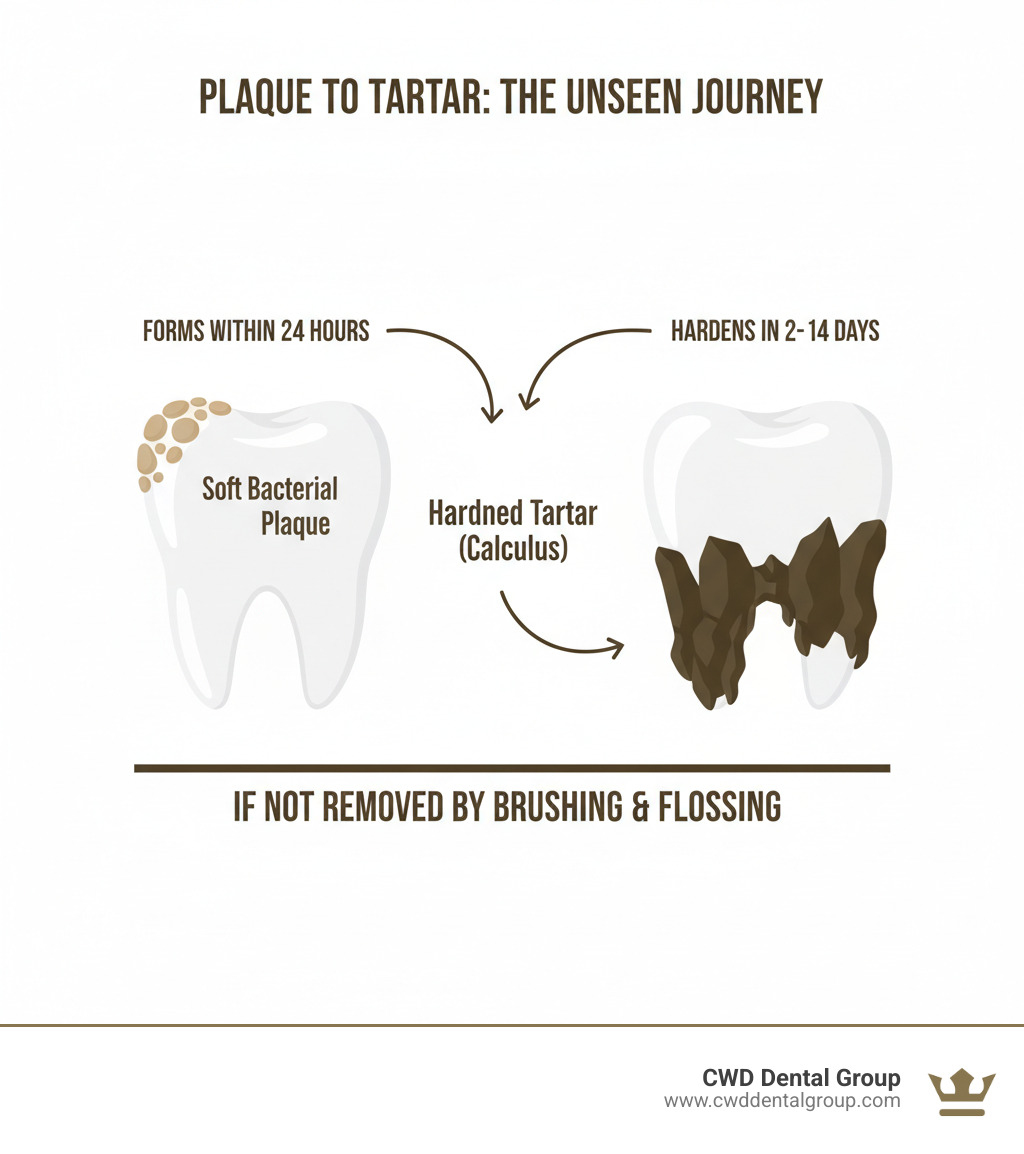
The Professional's Toolkit: A Look at Your Hygienist's Dental Teeth Cleaning Tools
Your hygienist uses a specialized arsenal of dental teeth cleaning tools, each with a specific job, to give you that fresh-from-the-dentist feeling. Let's look at what each tool does.
Examination Tools for a Clear View
Before cleaning, your hygienist performs an examination to assess your oral health.
The dental mirror is the most recognizable tool, providing a clear view of hidden corners of your mouth. This small, angled mirror, sometimes with a concave magnifying surface, helps your hygienist spot potential trouble spots early.
The periodontal probe (or explorer tool) is a slender instrument used to measure the depth of your gum pockets—the spaces between your teeth and gums. Healthy pockets are shallow (1-3 millimeters), while deeper pockets can signal gum disease. This tool also helps with cavity detection by feeling for soft or rough spots where decay might be starting. These examination tools are made from durable stainless steel that withstands repeated sterilization.
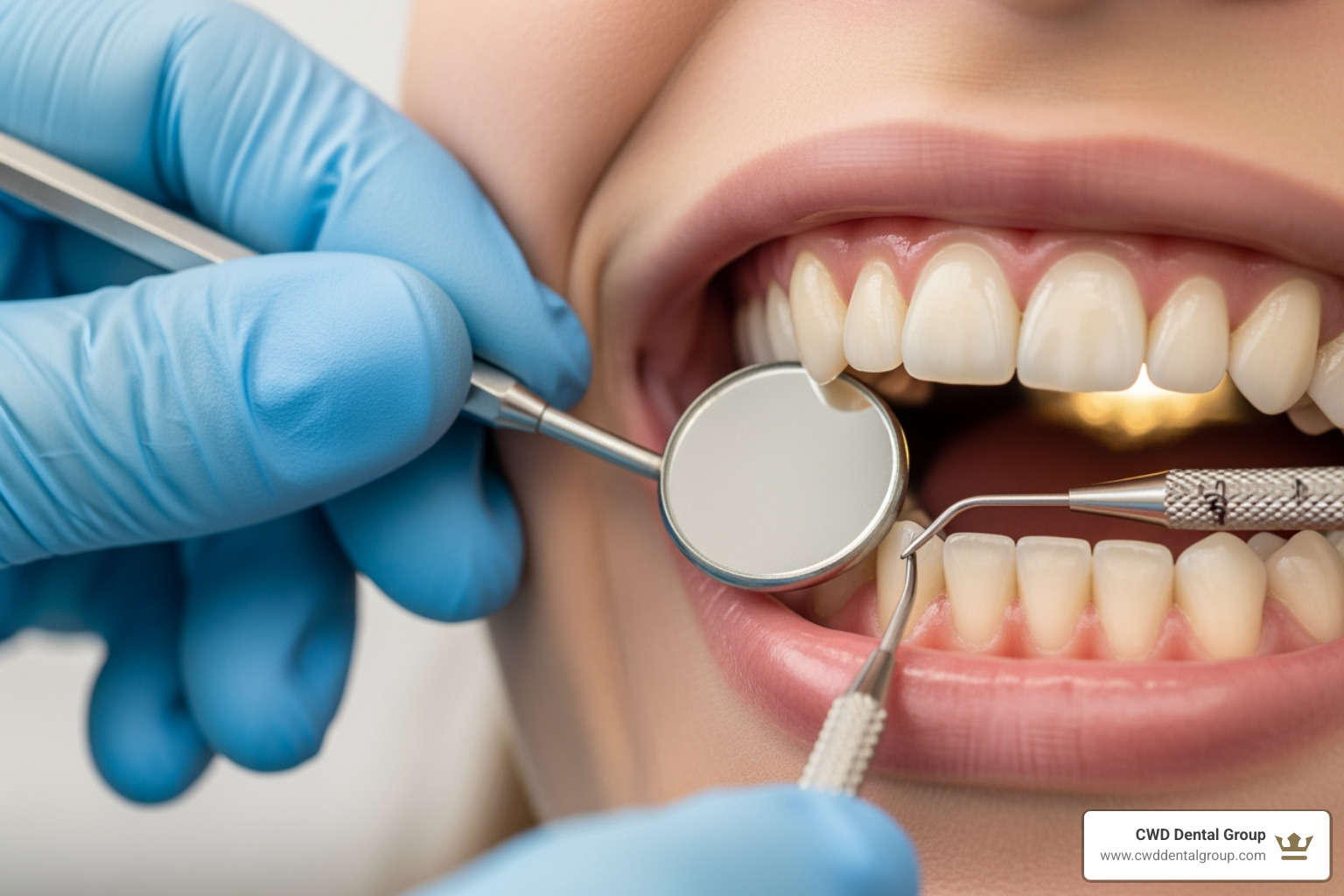
Manual Scaling Tools for Plaque and Tartar Removal
This is where your hygienist tackles the stubborn buildup that home care can't handle.
Hand scalers are precision instruments with sharp ends designed for plaque removal and tartar removal from the visible surfaces of your teeth (supragingival cleaning). The scraping sound you hear is the scaler carefully breaking away hardened deposits without damaging your enamel.
Curettes look similar but have rounded, spoon-like ends. This design is perfect for subgingival cleaning—going below the gumline. The rounded edge can slip gently into gum pockets to clean tooth roots without tearing delicate gum tissue, which is crucial for treating gum disease.
Both tools are made from medical-grade materials. After every use, they undergo rigorous sterilization via autoclave—a high-pressure steam chamber that eliminates any risk of cross-contamination.
Advanced Powered Cleaning Instruments
Stubborn tartar may require a high-tech approach.
The ultrasonic scaler uses high-frequency vibrations to shatter hardened tartar deposits. It also sprays a constant stream of water irrigation that cools the tip and washes away debris. This combination makes for efficient tartar removal, often reducing cleaning time and improving patient comfort compared to the pressure of manual scraping, especially for those with sensitive teeth.
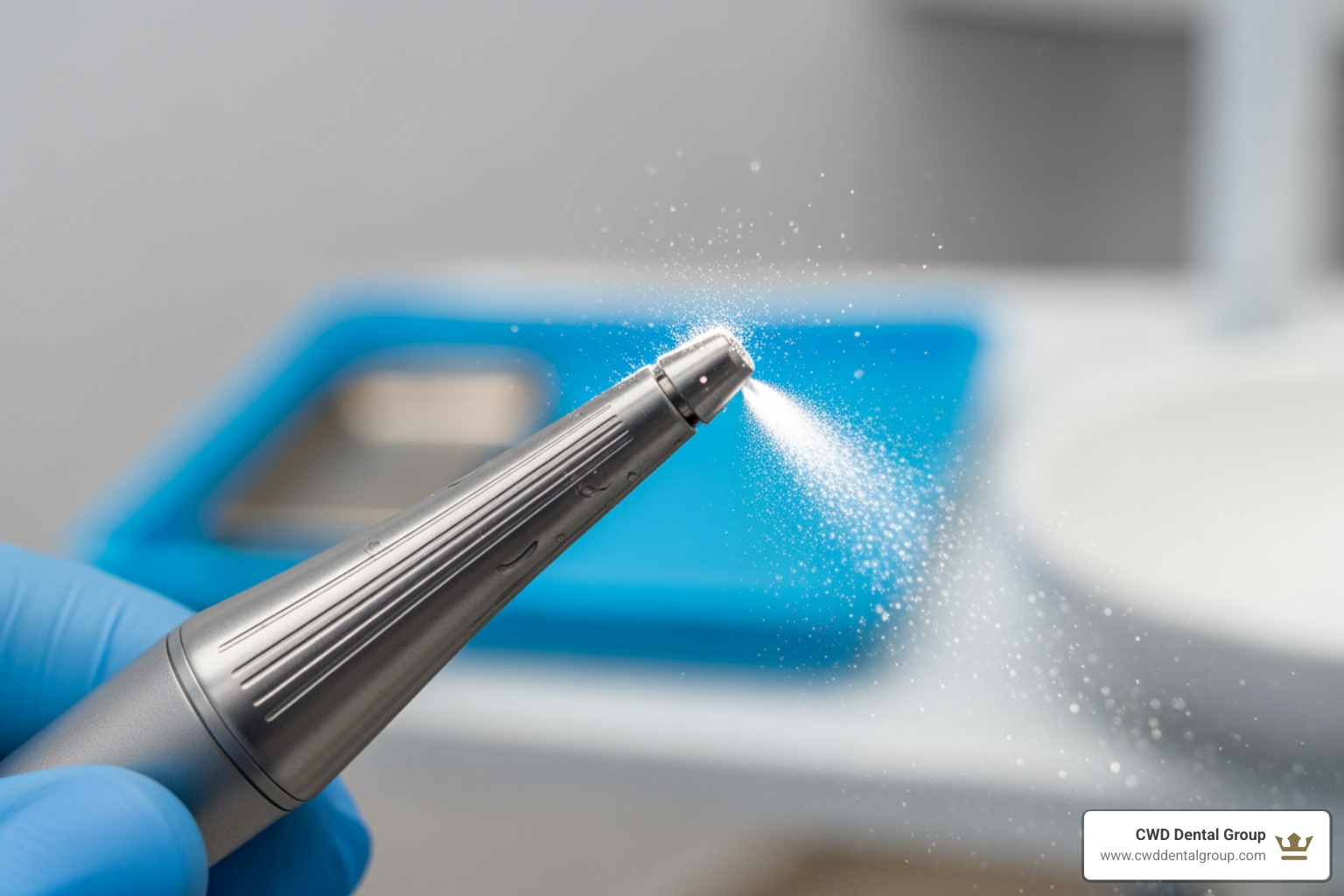
Polishing and Finishing Touches
Once the plaque and tartar are gone, it's time for the final steps.
The prophy angle (polisher) holds a small rubber cup that spins with a slightly gritty prophylaxis paste. As it spins, it buffs away surface stains and creates a smooth finish. This smoothing of tooth surfaces makes it harder for new plaque to stick.
Throughout the appointment, the saliva ejector (suction tube) removes excess saliva, water, and debris. Your hygienist will also use dental floss to ensure every surface is pristine, followed by a final rinse with a water syringe, leaving your mouth feeling fresh and clean.
At-Home vs. Professional Tools: What You Need to Know
While keeping your teeth clean between visits with an at-home kit sounds appealing, there's a vast difference between consumer products and the professional dental teeth cleaning tools we use at CWD Dental Group. Let's review what works for home care and why some tools should remain in professional hands.
Everyday Essentials for Home Care
Your daily routine is your first line of defense against plaque and tartar.
An electric toothbrush is a great choice, often featuring a two-minute timer as recommended by the ADA and a pressure sensor to protect your gums and enamel. However, a manual toothbrush with soft bristles is also effective when used with proper technique. Remember to replace it every three to four months.
Dental floss is non-negotiable, as it reaches between teeth where brushes can't. A water flosser is a great supplement, especially for those with braces, bridges, or implants. A tongue scraper can help combat bad breath by removing bacteria, and interdental brushes are useful for cleaning larger gaps between teeth.
The Risks of Using Professional-Style dental teeth cleaning tools at Home
At-home dental tool kits that mimic professional instruments are genuinely risky to use without proper training.
- Gum Damage: One slip with a sharp metal scaler can cut or puncture your gum tissue, leading to pain, bleeding, infection, or permanent gum recession.
- Enamel Damage: Scraping with the wrong angle or pressure can scratch your tooth enamel, creating rough spots where plaque clings more easily.
- Increased Sensitivity: Damaged enamel or gum recession exposes the sensitive dentin layer underneath, making teeth sensitive to hot and cold.
- Worsening Gum Disease: Instead of removing tartar, you might accidentally push it deeper under the gumline, making gum disease worse.
- Infection Risk: Home sterilization methods like boiling water are not enough. Without a professional autoclave, you risk introducing harmful bacteria into your mouth.
The bottom line is that a lack of professional training is the biggest risk. Dental hygienists undergo years of rigorous training to master the precise techniques required for safe and effective scaling.
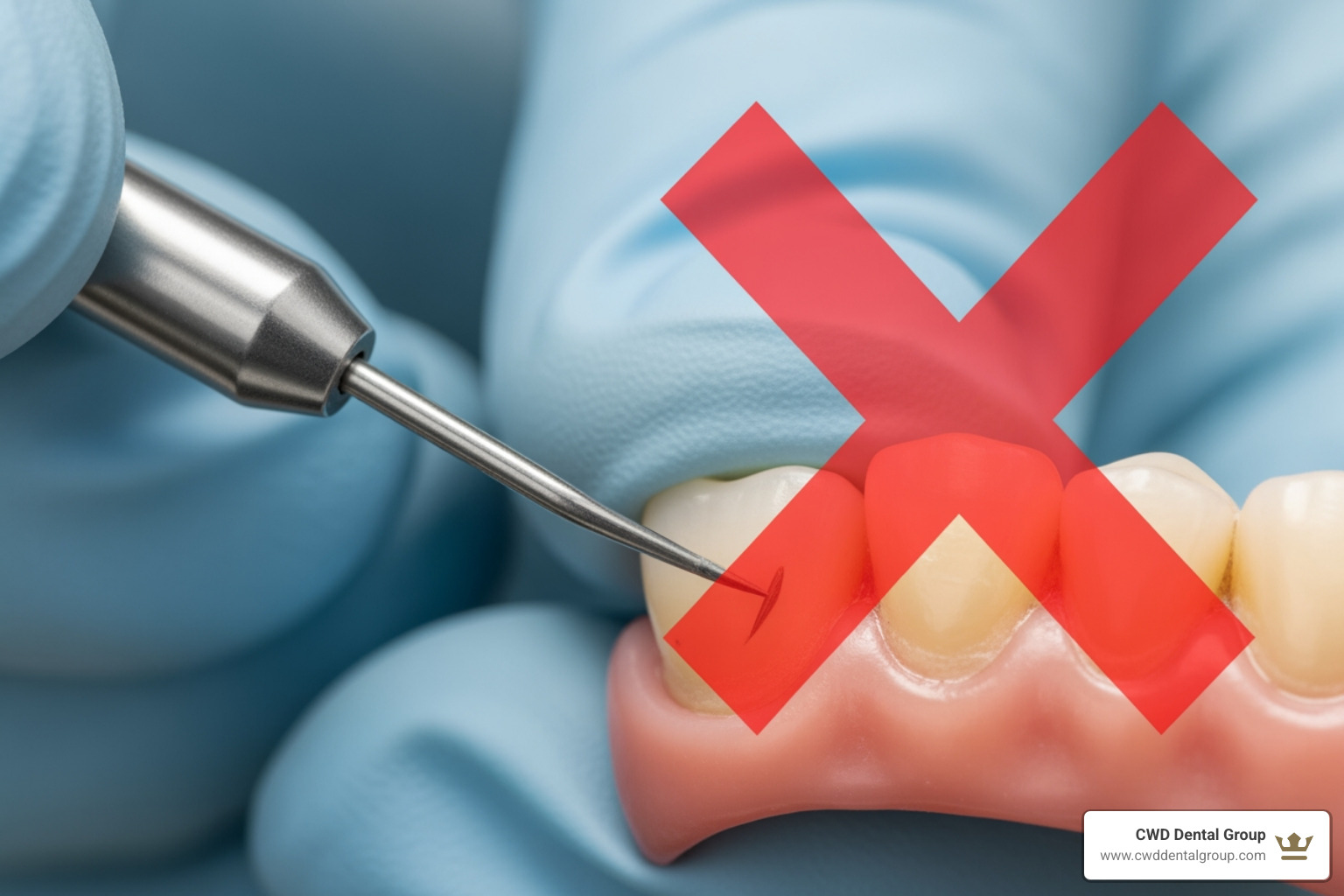
Why Professional and At-Home Tools Differ
The gap between professional dental teeth cleaning tools and consumer versions is about design and purpose. Professional scalers are made from high-grade medical stainless steel, engineered to be razor-sharp for removing hardened tartar (calculus). Their purpose is to clean all tooth surfaces, including below the gumline, which requires extensive training for safe use in a sterile environment.
In contrast, at-home picks are typically made of plastic or lower-grade steel. They are intentionally duller and designed only for superficial plaque or food removal. While this lowers the immediate injury risk, they are ineffective against tartar and can still cause damage if misused, especially since they are not sterile.
The most important difference isn't the tool itself—it's the trained professional holding it. The years of education and hands-on practice are what make professional tools safe and effective.
Your Role in a Sparkling Smile: Preparation and Maintenance
Oral health is a team sport. While we have the training and specialized dental teeth cleaning tools for a professional cleaning, your daily habits and regular visits make all the difference.
Signs You Need a Professional Cleaning
Your mouth often signals when it needs attention. Here are some signs to watch for:
- Visible tartar: Hard, crusty yellow or brown deposits along your gumline that brushing won't remove.
- Persistent bad breath: Halitosis that doesn't go away after brushing can be a sign of bacteria from plaque and tartar buildup.
- Bleeding or swollen gums: Red, puffy gums that bleed easily are a common first sign of gingivitis.
- Tooth discoloration: Heavy buildup can cause stains beyond what's normal for you.
- Increased tooth sensitivity: Tartar buildup can contribute to gum recession, exposing sensitive parts of your teeth.
If these sound familiar, it's time to schedule an appointment. For more guidance, explore the information on our patient resources page.
Preparing for Your Professional Cleaning Appointment
A little preparation can make your teeth cleaning appointment smoother and more productive.
- Share your medical history: Update us on any new medications or health conditions.
- Discuss dental anxiety: If you feel nervous, please let us know. We are trained to help you feel comfortable.
- Brush and floss before you go: Removing surface debris helps our hygienists focus on the stubborn tartar.
- Prepare questions: We love it when patients are engaged. Write down any questions you have for your hygienist.
- Ask for explanations: If you're curious about a procedure, just ask! Understanding the process can help reduce anxiety.
The Importance of Regular Visits and Long-Term Health
The American Dental Association recommends regular dental checkups, typically every six months for most people. These visits are essential preventive care.
Regular cleanings are your best defense against gingivitis (early-stage gum disease), which is completely reversible when caught early. If left untreated, it can progress to periodontitis, a severe form of gum disease that causes irreversible damage to the bone supporting your teeth and can lead to tooth loss.
Professional visits also allow for early detection of issues like cavities, gum disease, and even oral cancer. Finding problems early means simpler, less costly treatments. The consequences of neglect are real, leading to persistent bad breath, cavities, and progressive gum disease. Research also shows links between poor oral health and systemic conditions like heart disease and diabetes. Taking care of your teeth is part of taking care of your whole body.
The team at CWD Dental Group is here to partner with you. We have the expertise and professional dental teeth cleaning tools to keep your smile healthy. Your job is to maintain your home care and see us regularly.
Frequently Asked Questions about Dental Teeth Cleaning Tools
It's normal to have questions about your dental cleaning and the instruments we use. Here are answers to some of the most common ones.
Can I remove tartar myself at home?
The answer is a firm no. While at-home kits are tempting, tartar removal (scaling) requires specialized training and professional tools designed for trained hands only. Attempting to scrape off tartar yourself can severely damage your gums and tooth enamel, push tartar deeper below the gumline, and lead to infection. This procedure should only be performed by a licensed dental professional for your safety.
What's the difference between plaque and tartar?
Plaque and tartar are two stages of the same issue. Plaque is a soft, sticky, colorless film of bacteria that constantly forms on your teeth. You can remove it with daily brushing and flossing. If not removed, plaque hardens within 24 to 72 hours into tartar (also called calculus). Tartar is a hard, crusty deposit that bonds to your teeth and can only be removed with professional dental teeth cleaning tools by a hygienist. This is why daily home care is so critical.
Does a professional teeth cleaning hurt?
For most people, a professional cleaning is painless. You will likely feel some pressure and hear scraping sounds, but it shouldn't hurt. However, if you have sensitive teeth, inflamed gums, or significant tartar buildup, you might experience some discomfort.
Your comfort is our priority. Our hygienists are gentle and skilled. If you feel any discomfort, please let us know by raising your hand. We can adjust our technique, take breaks, or discuss other comfort options. If you have dental anxiety, tell us when you book your appointment so we can make your visit as pleasant as possible.
Your Path to a Healthier Smile
Understanding the purpose of professional dental teeth cleaning tools highlights the importance of your regular dental visits. While daily at-home care is your first line of defense, it can't replace the thorough cleaning and expert examination you receive from a professional.
Our hygienists apply years of training and skill, using specialized dental teeth cleaning tools to reach spaces you can't, remove hardened tartar, and spot potential issues before they become big problems. These regular appointments are key to preventing serious oral health issues and maintaining a bright, healthy smile for life.
At CWD Dental Group, our experienced team is passionate about providing exceptional care with the latest dental teeth cleaning tools and techniques. We are proud to serve our communities in Tallahassee, Havana, Quincy, Crawfordville, and Wakulla, Florida, and we're here to help you achieve your best oral health.
Ready to experience the difference? Explore our comprehensive dental services and let us help you on your path to a healthier, happier smile!

